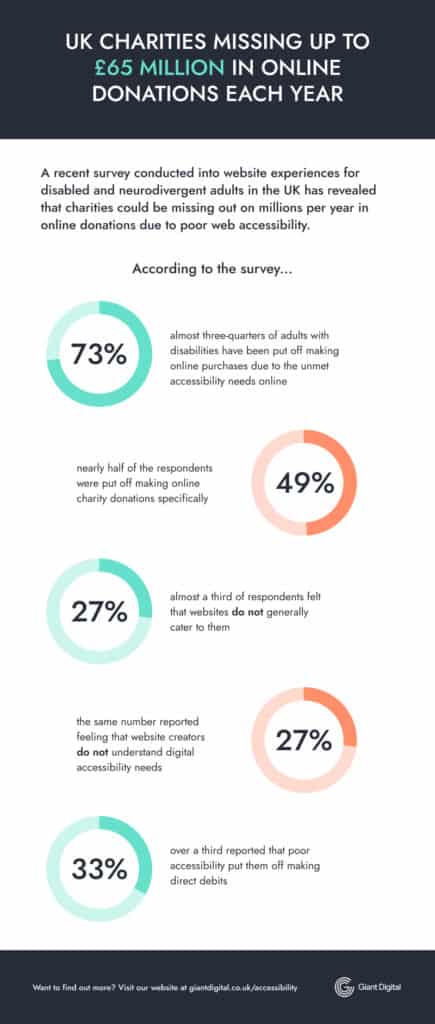Charities can access a free website accessibility health check to ensure equal access for everyone

In response to a recent survey into website experiences for disabled and neurodivergent adults in the UK, charities have the opportunity to access a free website accessibility health check with the goal of ensuring equal access and inclusivity for all people on all platforms.
The survey by OnePoll spoke to neurodivergent and physically disabled adults in the UK, asking them to rank whether websites currently cater to their needs.
Findings revealed that charities could be missing out on up to £65 million per year in online donations due to poor web accessibility. It also found that almost a third of respondents felt that websites do not generally cater to them, while the same number reported feeling that website creators do not understand digital and online accessibility needs.
Commissioned by Giant Digital, which specialises in web development solutions that help charities and not-for-profit organisations grow their online audience engagement, the survey took a deep dive into the impact of poor website accessibility.
The results unveiled “huge” room for improvement needed across the board, from web design to the ease of use of online donation platforms.
Almost half of survey respondents stated that they had been discouraged from making online donations in particular.
This year’s UK Giving Report by the Charities Aid Foundation unveiled that annual charitable giving had reached £12 billion, up from £10.7 billion in 2021. Having inaccessible websites could result in big potential losses for charities, Giant Digital warns.

“The findings from our recent survey shed light on the challenges faced by people who have been disproportionately impacted by inaccessible websites, and this valuable insight enables us to better understand their needs and create solutions that ensure inclusivity.
“Ultimately, charities are missing out on millions of pounds by not focusing on the fundamentals of their online presence.”
Giant Digital’s new website accessibility health check provides high-level insights into a URL’s accessibility status, generating a quick and concise report that has actionable recommendations for improvement. This health check service reviews key web elements such as alt text, colour contrast, keyboard accessibility, and video captions.
Alex added: “With the launch of our website accessibility health check service, we hope to empower and enable charities to enhance their digital presence, break down barriers, and truly engage with their audiences. By embracing accessibility, charities can maximise their impact and create a more inclusive online experience for all.”
Full survey findings and a full methodology, as well as a referral to the service, can be found here. For those seeking a more comprehensive audit, a detailed analysis will be available upon request.
Amy Tubb, Communications Lead at the Maternal Mental Health Alliance, understands the importance of improving website accessibility. She commented: “The team at Giant Digital have proven how knowledgeable they are in this area and have taken an accessible-first approach to the design and build of our new website, ensuring that our new platform is inclusive and easy for all of our users to interact with, from busy clinicians looking for research through to mums seeking urgent support.”
Chris Bradshaw, Product Strategy Director at Infinum, recently wrote an exclusive article for AT Today about why accessibility features should be a technological prerequisite not an afterthought. He underlined the crucial importance of involving users both at the design stage and beyond the implementation stage of rolling out accessibility features to ensure they genuinely meet needs.

